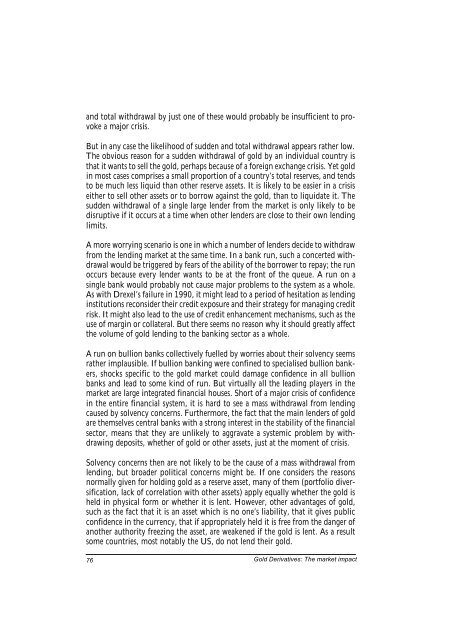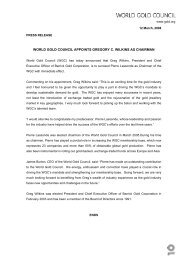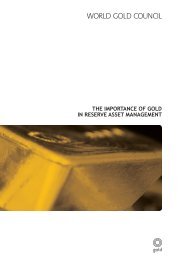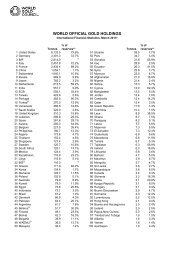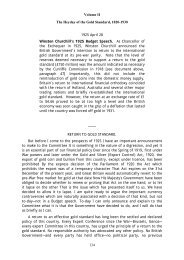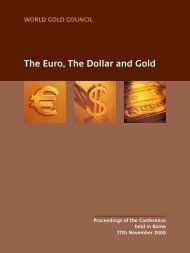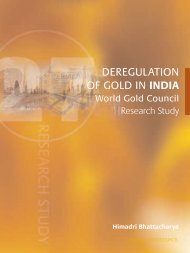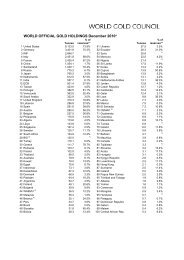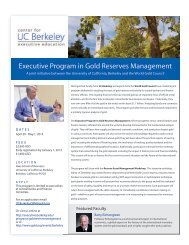Gold Derivatives: Gold Derivatives: - World Gold Council
Gold Derivatives: Gold Derivatives: - World Gold Council
Gold Derivatives: Gold Derivatives: - World Gold Council
You also want an ePaper? Increase the reach of your titles
YUMPU automatically turns print PDFs into web optimized ePapers that Google loves.
and total withdrawal by just one of these would probably be insufficient to provoke<br />
a major crisis.<br />
But in any case the likelihood of sudden and total withdrawal appears rather low.<br />
The obvious reason for a sudden withdrawal of gold by an individual country is<br />
that it wants to sell the gold, perhaps because of a foreign exchange crisis. Yet gold<br />
in most cases comprises a small proportion of a country’s total reserves, and tends<br />
to be much less liquid than other reserve assets. It is likely to be easier in a crisis<br />
either to sell other assets or to borrow against the gold, than to liquidate it. The<br />
sudden withdrawal of a single large lender from the market is only likely to be<br />
disruptive if it occurs at a time when other lenders are close to their own lending<br />
limits.<br />
A more worrying scenario is one in which a number of lenders decide to withdraw<br />
from the lending market at the same time. In a bank run, such a concerted withdrawal<br />
would be triggered by fears of the ability of the borrower to repay; the run<br />
occurs because every lender wants to be at the front of the queue. A run on a<br />
single bank would probably not cause major problems to the system as a whole.<br />
As with Drexel’s failure in 1990, it might lead to a period of hesitation as lending<br />
institutions reconsider their credit exposure and their strategy for managing credit<br />
risk. It might also lead to the use of credit enhancement mechanisms, such as the<br />
use of margin or collateral. But there seems no reason why it should greatly affect<br />
the volume of gold lending to the banking sector as a whole.<br />
A run on bullion banks collectively fuelled by worries about their solvency seems<br />
rather implausible. If bullion banking were confined to specialised bullion bankers,<br />
shocks specific to the gold market could damage confidence in all bullion<br />
banks and lead to some kind of run. But virtually all the leading players in the<br />
market are large integrated financial houses. Short of a major crisis of confidence<br />
in the entire financial system, it is hard to see a mass withdrawal from lending<br />
caused by solvency concerns. Furthermore, the fact that the main lenders of gold<br />
are themselves central banks with a strong interest in the stability of the financial<br />
sector, means that they are unlikely to aggravate a systemic problem by withdrawing<br />
deposits, whether of gold or other assets, just at the moment of crisis.<br />
Solvency concerns then are not likely to be the cause of a mass withdrawal from<br />
lending, but broader political concerns might be. If one considers the reasons<br />
normally given for holding gold as a reserve asset, many of them (portfolio diversification,<br />
lack of correlation with other assets) apply equally whether the gold is<br />
held in physical form or whether it is lent. However, other advantages of gold,<br />
such as the fact that it is an asset which is no one’s liability, that it gives public<br />
confidence in the currency, that if appropriately held it is free from the danger of<br />
another authority freezing the asset, are weakened if the gold is lent. As a result<br />
some countries, most notably the US, do not lend their gold.<br />
76<br />
<strong>Gold</strong> <strong>Derivatives</strong>: The market impact


